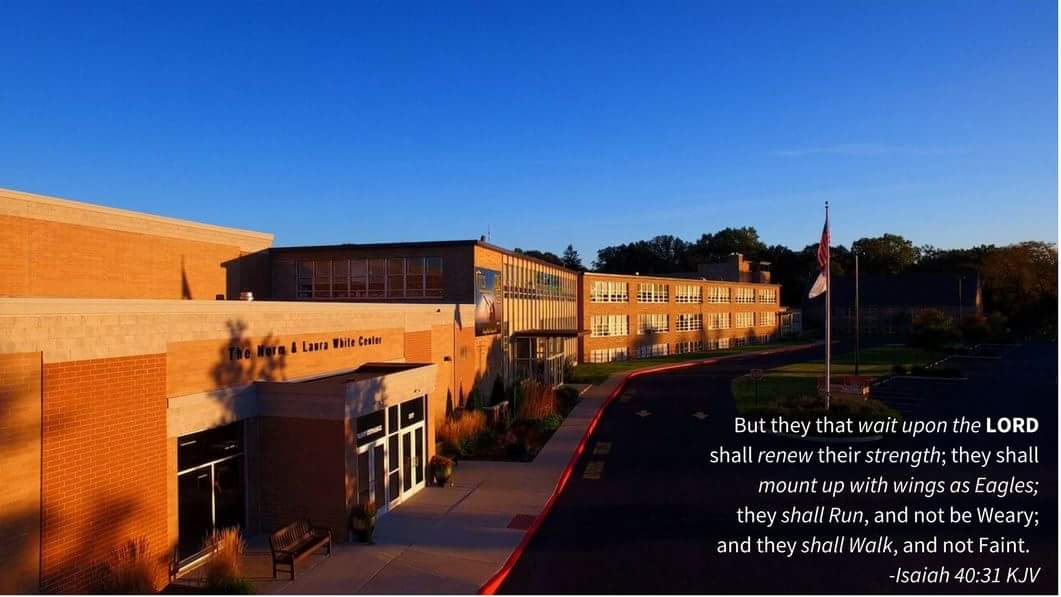
A growing number of Christian schools are differentiating themselves by shifting to classical Christian education. One example is Toledo Christian Schools in Toledo, Ohio. BaseCamp Live host, Davies Owens, visited Toledo Christian on a “BaseCamp Live RoadShow” to hear firsthand from three teachers about the transition. Listen in to learn about their journey as a community that wants to go back to what Christian education lost in the last few decades…the classical foundation.
The rich heritage of Toledo Christian Schools (TCS) lies in its unwavering commitment to Christian principles and academic excellence. Since 1975, the school has provided its educational program to students from across Northwest Ohio and is committed to providing a comprehensive, academically rigorous education from preschool through 12th grade.
Ohio School Differentiates Itself By Switching To Classical Christian
~A Conversation with Toledo Christian Schools
Estimated reading time: (3 min, 58 sec) 794words
Any savvy marketer will tell you that differentiation in the marketplace is key to success.
Differentiation is worth considering.
Some schools set themselves apart by their Olympic-sized pools. Others believe adding a STEM program will draw students.
A growing number of Christian schools are differentiating themselves, as well.
Rather than remaining conventional Christian schools, which are often inadvertently modeled after progressive schools, they are changing their entire educational approach. They aim to return to what education lost in the last few decades…the classical foundation.
From the Greco-Roman times to the Middle Ages and beyond, the classical model of education emphasized memorizing beautiful poetry, reading original sources, speaking persuasively and eloquently, and engaging in Socratic debate, to name a few methods.
Today’s classical Christian schools use these same educational tools to provide heart formation and intellectual cultivation in students. The wisdom and virtue that students gain differentiate them from the rest of the culture…and people notice.
Today, the largest growing segment of education is classical Christian education.
BCL’s new Roadshow visits Toledo Christian School
For a recent “Roadshow” episode, BaseCamp Live host Davies Owens visited Toledo Christian School (TCS).
Four years ago, the school began to pivot from conventional Christian to “Classical Christian.”
According to the teachers, “There was something really attractive and appealing about the classical model that others in the administration were drawn to. As they researched… they fully bought into it and then they made the effort to draw us in.”
Incremental transitions from the progressive model to the classical model
As a 40-year-old school teaching k-12, TCS now uses classical curriculum through the 8th grade. For the time being, the high school continues to use some of the former progressive curriculum, which many Christian schools follow in order to satisfy state standards.
Regardless of where they are in the transition, the new classical methodology has positively affected the entire school.
Ralph Felzer, Toledo’s High School English teacher for the last six years, describes how classical methodology has changed him as a teacher. “The most important step in education is not so much the passing along of information but the passing along of a passion. Helping students catch the enthusiasm or the excitement for learning, discovery and wonder.”
Math and history teacher for 7th- 10th grade, Sam Clausen, affirms that the classical approach to math and science means that even though “algebra” and the “body” remain the same, students approach them with an added sense of awe and gratitude.
In the Humanities, teaching the Odyssey to 7th graders and Shakespeare to 8th graders new to classical has been challenging but rewarding for everyone.
Mark Buehler, Jr. High English teacher, shares, “We just had a conversation about the relationship the Greeks had with their gods and goddesses and the nature of their divine vs. the nature of the only divine. To have that conversation with 7th graders has been awesome.”
Also surprising is that the teachers have felt that some of the classical material has been easier to teach rather than more difficult. They attribute this to the richness and quality of the material. The books, rather than the teachers, entertain and captivate students.
As Owens aptly puts it, the teachers “don’t have to put sprinkles on” anymore by adding to or dressing up curriculum.
Classical Christian education takes the “long view”
When asked for words of encouragement for schools looking to transition to the classical Christian model, one teacher responded, “You fight because this needs fighting.” Another teacher shared, “It’s worth it to try and change the way people see the world.”
As Owens says, “There will be generations changed. This is the long view.”
As more and more Christian schools are discovering classical Christian, they are differentiating themselves from the competition and the culture. This return to what Christian education was for 1000 years means a priceless value to students for generations to come.
Key Takeaway
Schools also have to train parents to understand how the classical model differentiates the school and helps students.
Potential parental concerns include the age-appropriateness of the material, difficulty in comprehension and the thickness of the books. Parents can be intimidated about how to help their student. They worry if it is possible to balance a classical academic load with a sports schedule.
To hear the astute answers to these legitimate concerns, tune in to the BaseCamp Live Roadshow episode, as well as the “Backside” at the end of the show. You will be inspired by these and other stories of how classical is changing Toledo Christian School for the better.
